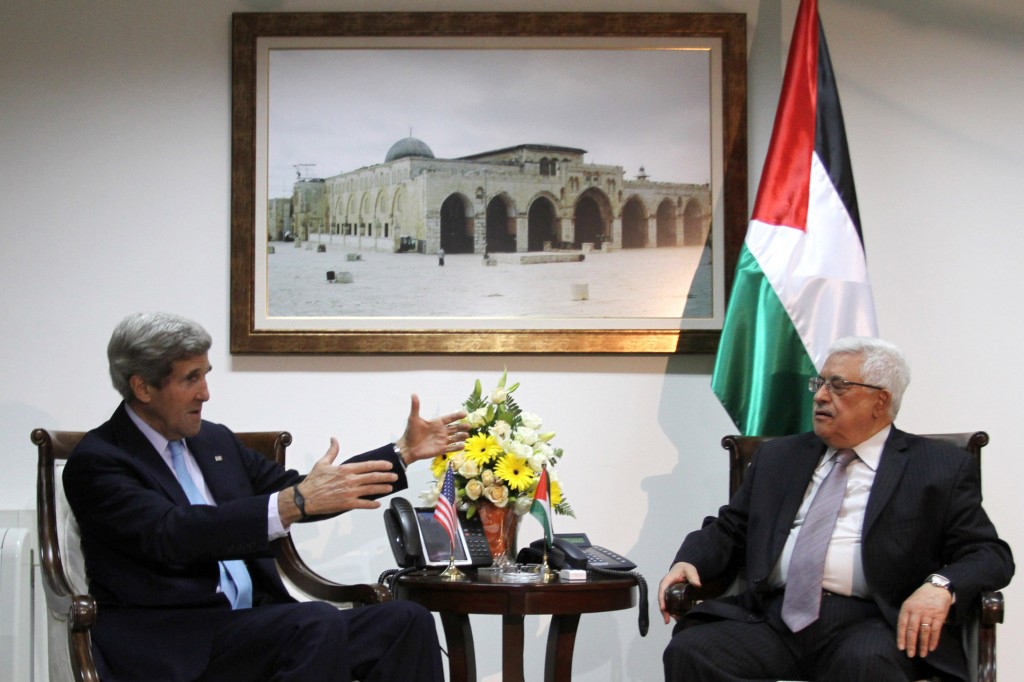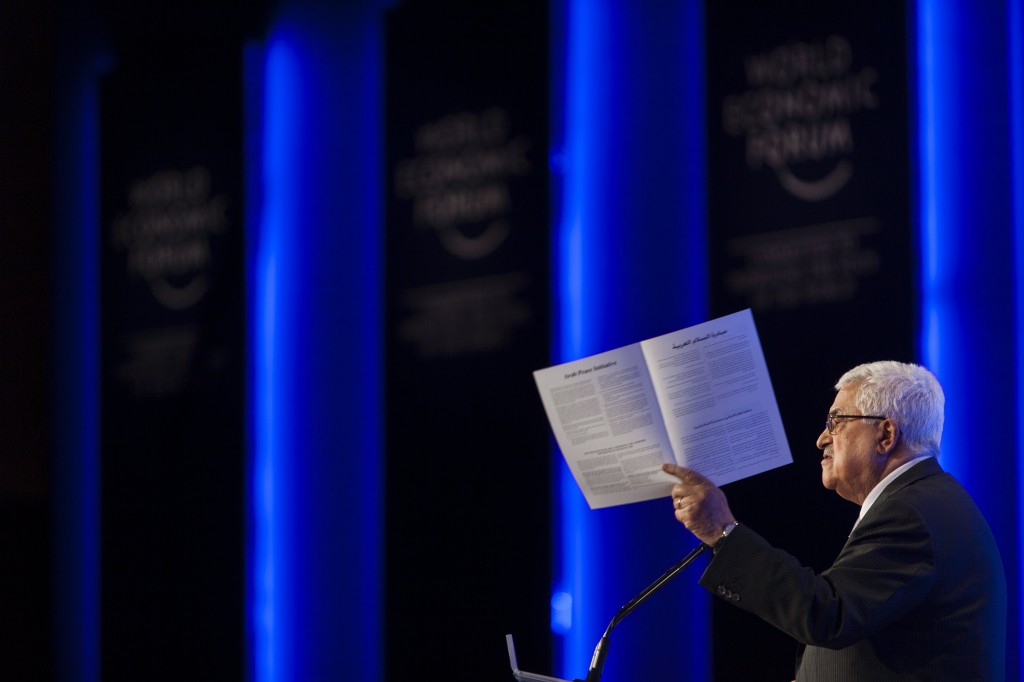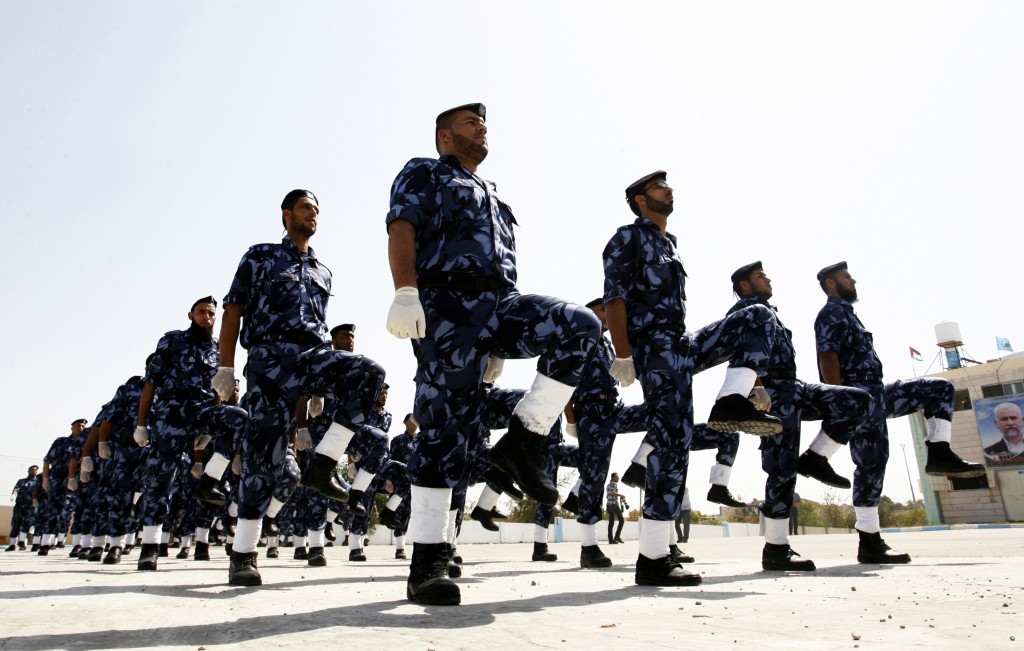Western leaders talk about peace negotiations between Israel and the Palestinians. But a third of the Palestinians live under a Hamas in Gaza, which will never make peace with Israel. What can they hope to achieve?
On September 16, 2013, Hamas official Mahmoud Al-Zahar dropped a bombshell. Following a meeting with the even more radical Islamic Jihad movement, Hamas—which has ruled the Gaza Strip since 2007—had decided to form a joint leadership with its Islamist counterpart. Each movement would nominate four officials to maintain “ongoing contact” between Hamas and Islamic Jihad, and devise a “political plan” for the future. According to the Hamas daily Al-Resalah, seven meetings had taken place prior to the announcement. “We weren’t just writing theoretical research,” Al-Zahar stated knowingly.
He also probably knew that the deal with the Iranian-sponsored terror group would signal another step away from reconciliation with Hamas’ secular rival, and the force that holds sway in the West Bank, Fatah.
Observers of the tumultuous developments in the Gaza Strip were probably not surprised by the announcement. The past few years have seen Gaza go from a rogue territory subjected to Israeli and international sanctions to a victorious political entity celebrating the ascent of political Islam—and back again. Now ostracized by Egypt’s new military regime, Hamas is in a tailspin, and in desperate need of new allies. The partnership with Islamic Jihad appeared to give Hamas precisely that, as well as a much-needed boost to its legitimacy and a sideways wink to Iran, its long-time patron. It showed, in short, that Hamas is still determined to seize leadership of the Palestinian national movement from the Fatah regime in the West Bank.
Yet Western politicians and diplomats appear not to have noticed. They are still romancing the peace process between Israel and the Fatah-dominated Palestinian Authority, shepherding Israeli and Palestinian officials through negotiations, and pushing economic and political incentives for the two sides to reach an agreement as if Hamas’ intransigence doesn’t exist. Indeed, as recently as September 25, U.S. President Barack Obama announced before the assembled delegates of the United Nations General Assembly that alongside the Iranian nuclear threat, advancing the peace process would be one of America’s two top diplomatic priorities in the near term. “The time is now ripe,” he declared, “for the entire international community to get behind the pursuit of peace.”
But Al-Zahar’s announcement underlines the basic futility of these efforts. The truth is that, so long as the Hamas regime continues to rule Gaza, there is virtually no chance of a viable and comprehensive final-status agreement, at least anything that extends past the West Bank. Western leaders’ indifference to this fact and its origins is not only a grave mistake, but a distraction from an outcome that might actually bring peace between Israel and the Palestinians.
Fatah and Hamas, it should be said, have been paying lip service to their desire to unify their regimes for nearly six years. Why have they failed to do so?
The most immediate reason is elections. Fatah has demanded that they be held immediately in Gaza, the West Bank, and East Jerusalem. Hamas wants to be included in the PLO—the representative body of all Palestinians—before any vote takes place. Fatah has not and likely will not agree to this, if only for fear that Hamas will eventually take over the PLO itself.
But the rivalry between the two movements goes much deeper. In particular, they are split over very basic issues of ideology. Fatah is a secular revolutionary movement and has always been the largest faction of the PLO. Its former chairman, the late Yasser Arafat, signed the Oslo Accords with Israel in 1993, thus recognizing the State of Israel, ostensibly on behalf of all Palestinians. Hamas, in contrast, is an Islamic offshoot of the Muslim Brotherhood and refuses to recognize the Jewish state in any form. Indeed, it continues to refer to Israel as “the Zionist entity.”

U.S. Secretary of State John Kerry talks peace with PA Chairman Mahmoud Abbas. Photo: Issam Rimawi / Flash90
The two movements are also intensely divided by Fatah’s security cooperation with Israel. Fatah’s American-trained forces work closely with their Israeli counterparts to maintain the peace in the West Bank, whereas Hamas insists on continuing its “armed resistance” (i.e. terrorism) against the Jewish state.
In the summer of 2012, as Hamas was celebrating the five-year anniversary of its takeover of Gaza, Hamas Interior Minister Fathi Hammad summed up the divide fairly well. In his speech at the Gaza police academy’s graduation ceremony, he declared that “there will be no reconciliation with secularism. Reconciliation is first with God. Only the rule of Islam will prevail.” The “secularism” Hammad was referring to was that of Fatah and its members.
But Hammad wasn’t finished. Pointing at the graduating cadets, he declared that “these men will hunt down collaborators. We will not allow [Fatah] to pursue our warriors, as is the case in the West Bank.” By branding Fatah “collaborators,” Hammad was saying that as long as the Palestinian Authority continued to work with Israel, Hamas could not possibly come to terms with it.
But Hamas is not alone in its attitudes. Fatah is equally unwilling to reconcile with its Islamist rival. As early as May 2012, PA President Mahmoud Abbas himself rejected including Hamas in a unity government. “Everybody in the government should recognize Israel, denounce terrorism,” he declared. “Hamas is the opposition. If I allow them to be in the government, it will not work.”
Nonetheless, a series of thus far futile attempts to reach a unity agreement continued. By mid-2013, however, Fatah began to hint at abandoning any effort at reconciliation, largely as a result of the military coup that toppled Egypt’s Muslim Brotherhood president Muhammad Morsi. Azzam Al-Ahmad, the Fatah official responsible for unity talks with Hamas,told a Palestinian radio station in mid-August that Fatah will “not remain captive to Hamas” and will make “painful decisions” in regard to the Islamic movement. In early September, these options were discussed at Fatah’s Revolutionary Council meeting in Ramallah. They were rumored to include declaring the Gaza Strip a “rogue entity” and even trying to retake the Strip with Israel’s help.
Following the meeting, Fatah spokesman Ahmad Assaf explicitly linked Hamas to the now-defunct Muslim Brotherhood government in Egypt. The Brotherhood was now a pariah in Egypt, and Fatah was determined to capitalize on that fact. In a press release issued on September 16, Assaf blamed Hamas’ “ongoing reliance on foreign agendas and regional powers, as well as its ideological and organizational connection to the Muslim Brotherhood” for the suffering of Gaza’s citizens. “Before the coup, reconciliation prospects were very bad,” one Palestinian political commentator told Al-Jazeera recently. “Now, they are much worse.”
It was not a coincidence that these statements emerged just as a previously negotiated three-month period for establishing a Fatah-Hamas unity government expired. This marked the last in a series of abortive agreements between the two movements. The much-celebrated Cairo agreement of May 2011 was supposed to establish a Hamas-Fatah caretaker government and prepare for national elections. In February 2012, Hamas political chief Khaled Mashaal and PA President Abbas issued a joint declaration in Doha, Qatar that reaffirmed their commitment to unity. Three months later, the two movements returned to Cairo and signed yet another accord. None of these agreements were implemented, and today the two factions are more or less back where they started.
In fact, it is fair to say that Hamas and Fatah have never been further apart. The territories they rule are quickly becoming wholly separate and autonomous entities, and their mutual enmity shows no signs of abating. Yet decision-makers in the West consistently disregard this fact, and appear unwilling to understand what it means in terms of the success or failure of the traditional Israeli-Palestinian peace process.
This failure is all the more striking because of how profoundly the split between Fatah and Hamas has changed the reality on the ground. In particular, the Hamas regime in Gaza has now become what is essentially an independent state in all but name. Since it took over the Strip in June 2007, Hamas has been exercising de facto sovereignty over Gaza. It has a fully functioning government parallel to, and more independent than, the PA in the West Bank. It maintains its own security forces, entirely separate from their Western-trained and -funded PA counterparts. Before Egypt cracked down on the extensive network of smuggling tunnels connected to the Strip, Hamas levied taxes on incoming commodities. It has its own foreign policy, once bolstered by the Arab Spring and the resulting rise of similar Islamic movements to power and now buffeted by their setbacks. During the brief renaissance of Islamism preceding the recent move by the Egyptian people to reject Morsi’s Islamist authoritarianism, Hamas Prime Minister Ismail Haniyeh seemingly succeeded in overcoming Hamas’ isolation and made official visits to Egypt, Iran, Tunisia, Turkey, and Sudan.
But the West seems wholly oblivious to these developments. Perhaps the most glaring example of this disconnect took place in May 2013 at a World Economic Forum conference in Jordan. During a session dubbed “Breaking the Impasse,” U.S. Secretary of State John Kerry and International Quartet (Russia, the United States, the European Union, and the United Nations) envoy Tony Blair proposed to “break the impasse” in the peace process by giving $4 billion in aid to the Palestinians. This massive investment, Kerry asserted, could cut Palestinian unemployment by almost two-thirds, and double or even triple the PA’s agricultural output. “As the investment climate in the West Bank and Gaza improves,” Kerry asserted,” so will the potential for a financially self-sufficient Palestinian Authority that will not have to rely as much on foreign aid.”
Kerry’s speech did not mention Hamas, which was the elephant in the room during the entire conference. Instead, he spoke as if the PA of 2013 was the PA of 1993, as though the same government would manage these investments in both the West Bank and Gaza.
During his visit to Ramallah in March 2013, U.S. President Barack Obama did mention Hamas, condemning it for firing rockets at the Israeli town of Sderot the previous night. “Too often,” he said, “[Hamas] focuses on tearing Israel down rather than building Palestine up.” About the divide between Hamas and Fatah, as well as the de facto division of the PA into two separate entities, however, the president said nothing.
Kerry and Obama are not alone in their tendency to ignore the issue. When UN Secretary-General Ban Ki-Moon outlined the obstacles to Israeli-Palestinian peace at the Herzliya Conference in 2012, he said that Israel must stop building settlements while the Palestinians must provide “security” in the West Bank. He did not mention the split between Hamas and Fatah, which is certainly the most glaring, and probably the most important, obstacle to any comprehensive and lasting peace agreement.
It is difficult to see this attitude on the part of world leaders as anything other than willful, since there has been no lack of attention paid to the issue by journalists and academics. As far back as 2010, for example, Arab constitutional expert Nathan Brown wrote, “Hamas has abandoned most pretenses of living within the PA’s constitutional framework.” He continues:
International attention to the Israeli–Palestinian conflict tends to highlight major diplomatic initiatives and dramatic events while neglecting concrete developments, subtle trends, and grinding practical realities. Emphasis on the “peace process” has created an illusion that the two identifiable antagonists could come to a clear agreement on a two–state solution. But the widening division in the Palestinian ranks—between Hamas and Fatah, and between the West Bank and Gaza—remains unaddressed.
In a 2011 BBC article titled “Is Palestinian Unity an Illusion?” Gaza-based political analyst Omar Shaban declared that Fatah-Hamas unity was all but impossible. “The division between Hamas and Fatah is not about the prime minister or who gets how many cabinet seats here and there,” he said. “It’s much deeper than that. It is about their ideology, their agendas, the history, the desire for revenge between the two. Political unity is an illusion.”
Why then, are world leaders so wary of addressing the problem? The reasons appear to be both psychological and political. Psychologically, acknowledging the Palestinian rift as a significant—perhaps the mostsignificant—obstacle to peace between Israel and the Palestinians would involve jettisoning one of the foundations of the Oslo Accords, which recognized Gaza and the West Bank as integral parts of the same political entity. In effect, this would redefine the entire peace process by changing the debate from what the two sides can do to what the Palestinian side essentially is. In many ways, it would amount to admitting that a single, unified Palestinian state cannot be established in the near future. Politically, of course, this would undermine the rationale behind holding peace talks in the first place.
Experts on the region believe this final concern may well be justified. At a hearing before the U.S. Congressional Subcommittee on the Middle East and North Africa in February 2013, Matthew Levitt of the Washington Institute for Near East Policy testified:
Reconciliation between Fatah and Hamas is a prerequisite for advancing peace between Israelis and Palestinians. The idea is that Palestinians cannot negotiate with Israel in any serious way when divided between the West Bank under the rule of the Fatah-dominated Palestinian Authority (PA) and the Gaza Strip under the rule of Hamas. To be sure, PA officials in the West Bank can make neither demands nor concessions when it comes to the Gaza Strip, which they do not control.
Put simply, ignoring the rift between Fatah and Hamas or, at most, pretending it is transient, allows leaders to perpetuate the Oslo paradigm and continue with business as usual. They can keep funding the Fatah-led PA and pursuing the standard method of pressuring Israel and the Palestinians to make reciprocal concessions as if nothing has changed in two decades.
This “head in the sand” approach to the conflict, however, is an extremely risky one. In particular, it makes the international community seem completely detached from political reality in the eyes of both the Israeli and Palestinian people, who will ultimately have final approval over any eventual peace agreement.

Palestinian Authority Chairman Mahmoud Abbas, holding the Arab peace initiative document, May 2013. Photo: Flash90
For its part, Israel has few illusions on the subject. Israelis are well aware of the fact that the PA is drastically different from the Hamas government, particularly in regard to the security situation. While Fatah has gradually brought West Bank terrorism to an unprecedented low, Hamas happily allows rockets to fall on Israeli civilians when the political climate is right. Nonetheless, Israelis are unlikely to approve any significant concessions to a Palestinian leader who controls only two-thirds of his population and 85 percent of his territory. For any Israeli prime minister, hawk or dove, half a peace is difficult to sell to the public.
On the Palestinian side, “reconciliation,” or musalaha, has become an empty cliché on both sides of the political divide. For the most part, Palestinians have lost faith in their leaders’ ability to pay the price of reconciliation, which would involve giving up the political and economic power both sides have consolidated since Hamas took over Gaza.
So long as the international community continues to ignore the reality of the split between Hamas and Fatah and, in particular, the existence of a de facto Hamas-ruled statelet in Gaza, peace between Israel and the Palestinians is likely to remain elusive. In effect, the unwillingness of Western diplomats to face up to these realities has rendered the peace process almost meaningless. Put simply, the West is pursuing old solutions to a new problem. Needless to say, these old solutions, such as economic incentives, diplomatic pressure on both sides to return to the negotiating table, and attempts to persuade them to accept the same parameters as previous talks, are unlikely to yield positive results.
Unfortunately, willful blindness, political correctness, and wishful thinking have made a paradigm shift on the part of the West extremely difficult. But such a shift must occur before any peace agreement can be reached. The West, and especially the United States, must acknowledge that the primary obstacle to peace is not settlements or an unwillingness to negotiate, but the Hamas government itself.
Should it do so, it will be forced to make some bold and difficult decisions. But these decisions are absolutely necessary for the West to accomplish its professed goals. If the Obama administration and other Western leaders do indeed believe that a final status agreement ending all mutual claims is the solution to the Israeli-Palestinian conflict, then they have only two policies to choose from: Pressure Hamas to recognize Israel, or remove it from power. Whichever path they choose, clarity and honesty about the realities of the Israeli-Palestinian conflict would be infinitely preferable to the West’s current policy of self-deception.
![]()
Banner Photo: Abed Rahim Khatib / Flash90






